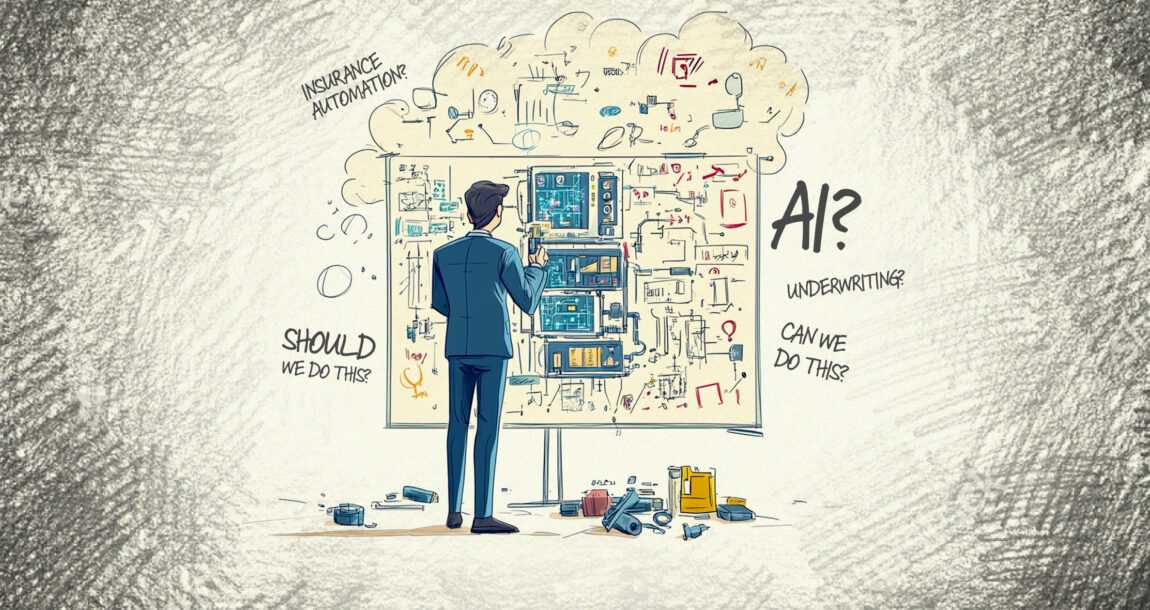Are life insurers underestimating their ability to implement AI?

Although a recent survey found nearly 50% of American life insurers say they are not ready to implement AI, one industry leader believes they may be underestimating their capabilities.
In a study conducted by LIMRA, Equisoft and Universal Conversion Technologies, around 70% of life insurers expressed progressive views about AI. Yet, 46% said they are not quite ready for implementation.
Mike Allee, president, UCT, pointed out that the survey reflected insurers’ outlook of themselves rather than scoring actual readiness against a benchmark.
“As we review the scores, we see the insurance companies having a sophisticated data infrastructure already, but yet not really willing to say, ‘Hey, we’re ready for AI.’ I think there’s the old adage of you don’t know what you don’t know until you know it… They may be closer to ready than they realize,” Allee said.
Forward-thinking but unprepared
The “Assessing Data Readiness for AI in the Life Insurance Industry” study surveyed life insurers in the United States, Canada, Mexico, Colombia and Australia. Companies were given six areas of data readiness and asked to assess themselves on a spectrum of maturity.
Sixty-six percent of US insurers said they are “progressive” when it comes to implementing AI, while another 33% said they are “maturing” in this respect. However, 66% said they are either “not really ready” or “not at all ready” to implement AI.
Every single US insurer surveyed (100%) pointed to Data Readiness as among the top three barriers to getting value from AI.
AI hesitancy
Allee said the survey suggests American insurance life insurers recognize the value of AI, but seem hesitant to take the final step.
“They haven’t yet layered AI programs and AI strategies on top of their current data foundations. So, I think they know that, but yet they’ve not done the heavy-duty lifting and moving and strategizing in order to really understand what they don’t know about AI requirements from their data infrastructure,” he said.
This could be why many insurers hesitate to declare themselves fully ready for the AI wave of innovation and technology for the time being.
Subjective uncertainty
Allee emphasized that the uncertainty is subjective and reflects only what the surveyed carriers think of themselves.
“You can look at the numbers that came out of the survey as hard and fast facts, but really it deals with the people — each of the CIOs and their teams that participated. So, it’s a bit subjective about how ready they really are, but I think it does raise the human aspect of implementing technology programs in general,” he said.
Allee noted that there will always be companies more eager to embrace technology than others. But AI has “even more question marks around it” because it’s still relatively new and continues to develop quickly.
“I think, because of some of the power of the technology, we are not really sure how we’re going to harness it yet as an industry. This is where some of these questions come from and why the uncertainty is there, because there’s just not a whole lot of well-defined use cases yet,” he said.
Life insurers: Ready or not
Regardless of readiness, Allee projects there will be increasingly forward movement towards embracing AI in the future.
“I think what we’re going to see is there will be companies that are realizing and recognizing the benefits. Advisors that are doing business with those companies, or who might want to know who are those companies that are investing in it and maybe go after contracts with them, could also be a strategic way for the advisor community to approach that,” Allee said.
Additionally, he projects there will be significant investment in companies that are developing AI.
“You’re going to have this interesting mismatch of companies that invest in AI and are enhancing themselves; companies that are somewhere in the middle that are reaping the benefits based off of their own software providers; and then the brokers themselves,” Allee said.
Tips for getting AI-ready
Alllee encouraged life insurance companies that are gearing up for AI preparedness to:
- Ensure your data is ready
- Double down on AI policies/governance structures
- Open channels of communication/collaborate
“Dream what you’re going to dream about AI, but then also have your feet on the ground in terms of data architecture and the way that data is supplied to the AI tools,” Allee said.
This due diligence will set the stage for effective AI implementation, alongside doubling down on existing governance processes to maintain those data stores.
Allee also noted that global collaboration could be a major opportunity.
“I think the insurance community can reap a lot of benefits without having to conduct a lot of experiments. If we open channels of communication, we can really move AI forward faster because there will be fewer fits and starts with company A failing, but company B succeeding,” Allee said.
UCT, a subsidiary of Equisoft, is a service provider of data conversion, migration and integration in the financial services sector. It was founded in 1992 and is based out of Irving, TX.
Equisoft is a technology company founded in 1994 and dedicated to providing insurance and financial services companies with software solutions. Its headquarters is in Canada.
LIMRA is one of the largest trade associations dedicated to insurance and financial services in the United States. It represents more than 700 members across the globe.
© Entire contents copyright 2025 by InsuranceNewsNet.com Inc. All rights reserved. No part of this article may be reprinted without the expressed written consent from InsuranceNewsNet.com.
Rayne Morgan is a journalist, copywriter, and editor with over 10 years' combined experience in digital content and print media. You can reach her at [email protected].






RILA sales leader Equitable Holdings races to meet lifetime income demand
Help your clients navigate tax regulations
Advisor News
- LTC: A critical component of retirement planning
- Middle-class households face worsening cost pressures
- Metlife study finds less than half of US workforce holistically healthy
- Invigorating client relationships with AI coaching
- SEC: Get-rich-quick influencer Tai Lopez was running a Ponzi scam
More Advisor NewsAnnuity News
- Trademark Application for “EMPOWER MY WEALTH” Filed by Great-West Life & Annuity Insurance Company: Great-West Life & Annuity Insurance Company
- Conning says insurers’ success in 2026 will depend on ‘strategic adaptation’
- The structural rise of structured products
- How next-gen pricing tech can help insurers offer better annuity products
- Continental General Acquires Block of Life Insurance, Annuity and Health Policies from State Guaranty Associations
More Annuity NewsHealth/Employee Benefits News
- New Managed Care Study Findings Have Been Reported by G. Martin Reinhart and Co-Researchers (Psychiatric Medication Prescribing by Nurse Practitioners and Physician Associates for Medicare Beneficiaries): Managed Care
- Data on Managed Care Reported by Researchers at American Dental Association (Early association of expanded Medicare dental benefits to dentist billing in Medicare): Managed Care
- Researchers to study universal health care, as Coloradans face $1 billion in medical debt
- Veteran speaks out on veterans mail-order drug bill
- National Life Group Selects FINEOS AdminSuite to Transform Living Benefit and Life Insurance Claims Operations
More Health/Employee Benefits NewsLife Insurance News